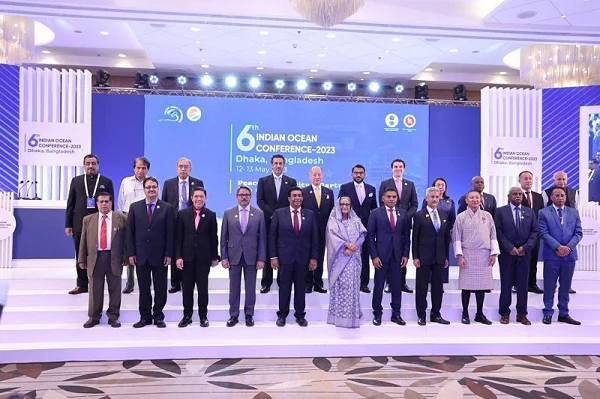

External Affairs Minister S Jaishankar with Bangladesh Prime Minister Sheikh Hasina, Mauritius President Prithvirajsing Roopun, Maldives Vice President Faisal Naseem, ministers and other top dignatries at the 6th Indian Ocean Conference in Dhaka on Friday (Images courtesy: India Foundation and Bangladesh Foreign Ministry)
External Affairs Minister S Jaishankar took an indirect shot at China and its controversial infrastructure project Belt and Road Initiative (BRI) on Friday, saying that the importance of adhering to law, observing norms and respecting rules remains a natural convergence point for the countries of the Indian Ocean Region (IOR).
Addressing the inaugural session of the 6th Indian Ocean Conference in Dhaka, with Bangladesh Prime Minister Sheikh Hasina and Mauritius President Prithvirajsing Roopun also present on the dias, Jaishankar listed broad principles that apply to all, emphasising that it is not possible to build a stable international order without certain pre-requisites.
“When nations disregard their legal obligations or violate long-standing agreements, as we have seen, the damage to trust and confidence is immense. It is therefore essential that all of us take the long view of our cooperation, rather than a tactical one of our interests,” the minister said.
He spotlighted the four Guiding Principles and the 15 Objectives of Bangladesh’s outlook, its respect for the 1982 UN Convention on the Law of the Seas (UNCLOS), stating that it is essential for the credibility of the global order that such foundational regimes are “respected and scrupulously observed” by all signatories.
Without naming China and its much-hyped BRI, which has been labelled by many analysts as an essential component of Chinese President Xi Jinping’s expansionist strategy, the EAM mentioned that a significant “shared concern through the Indian Ocean” is that of unsustainable debt generated by unviable projects.
“There are lessons from the last two decades that we ignore at our peril. If we encourage opaque lending practices, exorbitant ventures and price points that are unrelated to the market, these are bound to bite us back, sooner rather than later.
“Especially so when sovereign guarantees have been proffered, not always with due diligence. Many of us in the region are today confronting the consequences of our past choices. This is time to reflect and reform, not one to repeat and reiterate,” said Jaishankar.
Maldives Vice President Faisal Naseem, Singapore Second Minister for Foreign Affairs Mohamad Maliki Bin Osman, Bangladesh Foreign Minister A K Abdul Momen and India Foundation’s Governing Council member Ram Madhav also addressed the gathering.
Started in 2016, the Indian Ocean Conference (IOC) has emerged as the flagship consultative forum for countries in the region over regional affairs. The conference endeavours to bring critical states and principal maritime partners of the region together on a common platform to deliberate upon the prospects of regional cooperation for Security And Growth for All in the Region (SAGAR) as envisioned by Prime Minister Narendra Modi.
The 6th edition of the conference is being organised by India Foundation in association with Bangladesh’s Ministry of Foreign Affairs and S Rajaratnam School of International Studies in Singapore with the theme of ‘Peace, Prosperity and Partnership for a Resilient Future’.
Addressing the gathering of key stakeholders to chart the roadmap for strengthening the Indian Ocean Region, Jaishankar stressed on collectively working on facilitating smooth and effective connectivity.
From India’s perspective, he said, efficient and effective connectivity to ASEAN in particular will be a game-changer and the reason why the government led by PM Modi has given it a top priority.
“For a nation like India, this means a land-connect to South East Asia. And a multi-modal one to the Gulf and beyond. Central Asia offers its own distinct challenges due to obstacles in between. Collectively, the more we work on facilitating smooth and effective connectivity, the better off we all are. And obviously, we need to respect sovereignty and territorial integrity while doing so,” stated Jaishankar.
He also remarked that just because the world is “understandably seized of the larger domain” of the Indo-Pacific, one should not underplay the issues and challenges of one of its core constituents – the nations of the Indian Ocean.
“Many nations of the Indian Ocean still address developmental challenges that may no longer be relevant in the Pacific. So, even while impressing the essential coherence of the Indo-Pacific, I would urge that we also focus determinedly on the Indian Ocean nations and their challenges,” he said.
The minister concluded his address by reiterating India’s commitment to the well-being and progress of all nations of the Indian Ocean.
“We have dedicated bodies like the Indian Ocean Rim Association or the Indian Ocean Naval Symposium, with their specific mandates. We expand on that belief through the Neighbourhood First policy, the SAGAR outlook and our approach to the extended neighbourhood. Beyond that, we believe that a seamless transition into an Indo-Pacific is to our collective advantage.”
The Deputy Chief of the Main Operations Directorate of the General Staff of the Russian…
BRICS Sherpa Secretary (ER) Dammu Ravi participated in the BRICS Sherpas Meeting being held in…
The Border Security Force (BSF) Director General Daljit Chawdhary on Friday met with Union Home…
By Shailesh Yadav Google Gemini, the generative artificial intelligence tool of technology major Google, can…
Union Home Minister Amit Shah spoke with Chief Ministers on Friday and asked them to…
Raja Abid, Chairman of the Revolutionary Students Organisation, has condemned the deteriorating education system in…